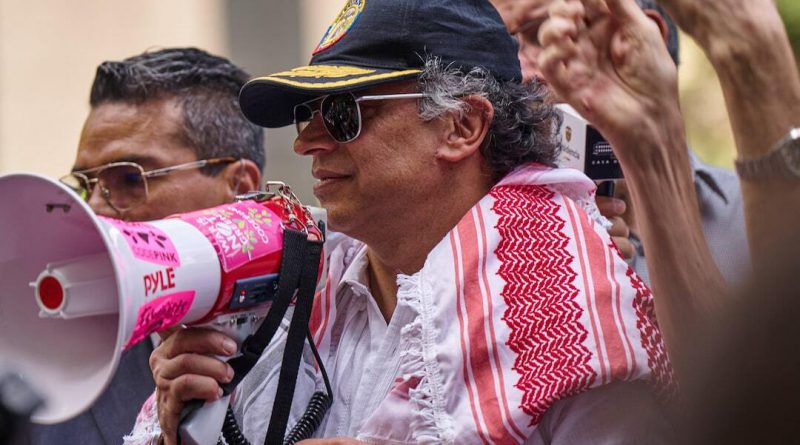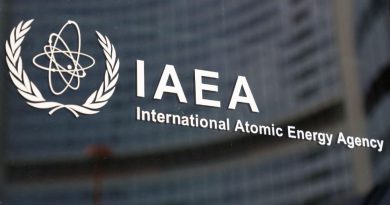US to revoke Colombian president’s visa over comments at pro-Palestinian gathering
New York – Colombian President Gustavo Petro drew worldwide attention at the sidelines of the 80th United Nations General Assembly when he addressed a gathering of pro-Palestinian demonstrators in New York.
With a message that resonated far beyond Dag Hammarskjöld Plaza, Petro emphasized the moral responsibility of nations to stand by humanitarian values and called for a stronger, collective global response to the ongoing conflict in Gaza.
Speaking with passion and conviction, Petro told the crowd that the world cannot remain silent in the face of suffering. “This force has to be bigger than that of the United States,” he declared, calling for a global coalition that prioritizes humanity and justice above political divides.
His words quickly traveled beyond the demonstration, making headlines and sparking intense debate among diplomats, analysts, and rights advocates alike.
Colombia’s evolving global voice
Petro’s speech reflects Colombia’s increasingly vocal role in international affairs. As the country’s first leftist president, he has consistently framed his foreign policy around peace, sovereignty, and human rights. This latest intervention – bold, unfiltered, and deeply humanitarian – aligns with his broader vision of positioning Colombia as a champion of justice on the world stage.
Observers note that Colombia has long been known for its domestic challenges, particularly related to conflict and narcotics. But under Petro, the country is seeking to transform its global image from that of a security recipient to that of a moral voice advocating for international law, human dignity, and the rights of vulnerable communities.
His presence at the pro-Palestinian demonstration was not simply symbolic; it was a deliberate statement about Colombia’s willingness to step into sensitive global conversations.
A message beyond politics
While Petro’s remarks have stirred controversy in some quarters, they carry a powerful underlying message: that the human cost of war must remain at the center of international diplomacy. By urging soldiers worldwide to act in the name of humanity, Petro sought to remind global audiences that wars are not fought in abstract but borne by families, communities, and children on the ground.
Diplomatic analysts highlight that Petro’s comments resonate with a growing chorus of voices calling for restraint, accountability, and peacebuilding in conflict zones. His approach may challenge traditional alliances – particularly Colombia’s historic closeness to the United States – but it also situates the country within a wider Latin American movement that emphasizes independence, sovereignty, and humanitarian solidarity.
Petro’s demonstration speech followed his official address to the UN General Assembly, where he called for stronger accountability in global conflicts and urged international institutions to pursue justice without fear or favor.
This year’s UNGA has been marked by deep divisions over the Gaza conflict, with multiple nations – including France, Britain, Australia, and Canada – officially recognizing Palestinian statehood.
The Colombian leader’s call for a “global force to protect humanity” is consistent with these shifts, reflecting mounting global pressure for new approaches to ending prolonged conflicts. His remarks underscore how Latin American leaders are increasingly willing to voice independent positions that echo broader humanitarian concerns.
US and Colombia ties remain important
Despite tensions, analysts caution against reading Petro’s speech as a break in relations with Washington. The United States remains Colombia’s largest trading partner and a critical ally in counter-narcotics efforts. While Petro has not hesitated to challenge U.S. policies, his administration continues to maintain open channels of dialogue.
Experts suggest that his latest remarks should be understood less as a rejection of alliances and more as a redefinition of Colombia’s international identity – one rooted in moral advocacy and independence.
Indeed, while the U.S. announced plans to revoke Petro’s visa, Colombia’s strategic relationship with Washington remains complex and enduring. Both nations continue to cooperate in trade, migration, and regional stability. Petro’s stance, then, is part of a balancing act: asserting Colombia’s sovereignty while maintaining engagement with traditional allies.
A wider humanitarian conversation
Petro’s call for “obedience to humanity” has already sparked conversations in global capitals and among civil society groups about the moral dimension of diplomacy. For many, his words reaffirm the need for the international community to act decisively not just to end wars, but to build a more humane global order.
The Gaza conflict has left tens of thousands dead and displaced millions, drawing strong reactions from leaders and rights organizations worldwide. In this context, Petro’s voice adds urgency to calls for peace, accountability, and international solidarity. His ability to channel moral conviction into political discourse has made him one of the most closely watched figures at this year’s General Assembly.
As the UNGA continues, Petro’s intervention serves as a reminder of the evolving role of middle powers like Colombia in shaping global debates. By stepping into one of the most contentious issues of our time, he has highlighted the importance of moral clarity in diplomacy.
Whether his words translate into policy shifts remains to be seen, but they have undeniably placed Colombia at the heart of an international conversation about justice, humanity, and the responsibilities of nations.



